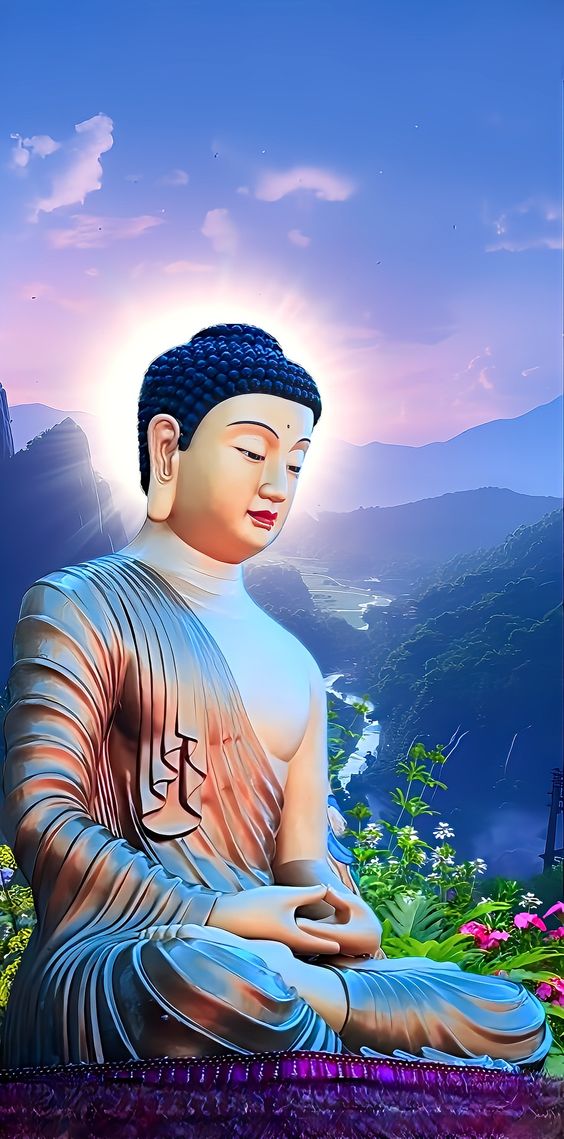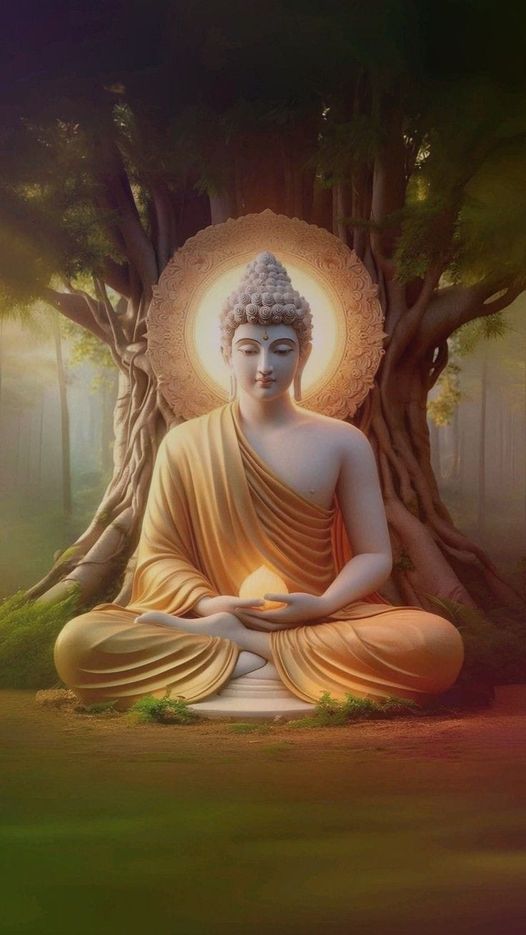Awakening for All: Awakened One
Nobody wants to continue sleeping forever, much less continue nightmares. We can’t control our dreaming, thus we want to be awake rather than dreaming. We want to be well aware of our living and to have our life well controlled rather than uncontrolled, causing dismay and devastation for oneself and others.
Nobody wants to be controlled by the bad karma (action, habit, heredity) of ourselves and ancestors. Karma is imbued with self-survival-strife, thus becoming self-centered, desirous, and divisive. Unless we change our karma, we are always bothered by these things individually, socially, and ecologically.
The Awakened One (Buddha) was awakened from the long night of nescience (no-witness, of nirvana: no wind, of karma) of four billion years. He was awakened to the Dharma (norm/form: law/phenomena) of Dependent Co-origination, i.e. that all phenomena are dependently originated on causes and conditions.
His Awakening prognosticated the Triple Learnings, Four Holy Truths, Five Precepts, Six Perfections, Eight Holy Ways, Twelve-limbed Dependent Co-origination, etc. He said that all living beings are karma-born, -heirs, -owners, -machines, -refuged, and he solved samsara (birth-death) suffering in nirvana happiness.
August 28, 2024 C.E.
Notes:
- Karma is instilled with the triple poisons of desire, divisiveness, and delusion (of ego/mei: I/my). The Buddha said that all living beings are karma-birthed, -heirs, -owners, -machines, and -refuged. He clarified that there is no self-substance with self-sameness (permanent) and self-sovereignty (wishful) entities due to the Dharma (Truth/Law) of all dharmas (phenomena), Dependent Co-origination. We as karma-machines must change to the Dharma-refuged in order to change the world in suffering to that in holiness (wholly wholesome: harmonious, healthy, and happy).
- Nirvana means no wind (of karma imbued with the triple poisons of desire, divisiveness, and delusion), where one can for the first time witness the Dharma world and become awakened from the long night of nescience to the Dharma of all dharmas in calm, clear, controlled, and careful conditions, then prognosticate problems and sufferings in the Four Holy Truths and the Eight Holy Ways.
- Dharma means 1. form (from d-harm: phenomenon) and 2. norm (from d-h-arm: norm: law operating through phenomena: ethic), and 3. the teaching of the law of all phenomena, that is, Dependent Co-origination (originally awakened on the origination of perception/consciousness depending on the sense organs and objects, but later applied to all phenomena, cf. note 5). This law is similar to the law of causality, now used by sciences, but deeper and wider, applied beyond objects – more on subjects and symbols – ideas, etc.).
- “The Dharma (Norm/Law/Truth/Ethic) of all dharmas (forms/phenomena/ truths/ethics)” is Dependent Co-origination, i.e., all phenomena are interdependently co-originated on limitless causes and conditions (similar to the Law of Causality, but deeper and wider – beyond conventions, conceptions, objects, etc.). This means that we are interrelated with other beings (other species, elements, stars, etc.), and relatives to each other, and that we must therefore live together harmoniously and strive to make a wholly wholesome world to become harmonious, health, and happy.
- The Triple Poisons are desire, divisiveness, and delusion (of a self-same, self-sovereign self). The “Triple Only” are only me, only now, and only money (short-sighted views and actions, which make the wider world worse) , which can be cured by the Triple Learnings of morality, concentration, and prognosis.
- The Four Holy Truths are that of suffering (duk-kha, wrong-going, going against wishes), cause of it (identified as craving: taṅhā/tṛṣṇā, lit. thirst, as drinking seawater), cessation of it (identified as nirvana: no-wind, cf. nivāte padīpa: lamplight in no-wind), and way for it (identified as the eight holy ways).
- The Five Precepts are essential ethic to keep the social and ecological holiness (wholly wholesomeness). No killing is to keep life, which is the key for anyone to fully develop one’s potential in the holy way and world. No stealing is to keep material base to live holy. No lying is to keep social base to live holy. No sexual misconduct is to keep the gender/generation base to live holy. No intoxicant is to keep the mental base to live holy.
- The Six Perfections (pāramitā) are perfections of giving, morality, patience, striving, concentration, and prognosis.
- The eight holy (ariya/ārya) ways (ariya-aṭṭhaṅgika-magga/ ārya-aṣṭāṅga-mārga) are right view (sammā‑diṭṭhi/ samyag-dṛṣṭi), right thinking (sammā-saṅkappa/ samyak-saṃkalpa), right speech (sammā-vācā/ samyag-vāc), right action (sammā-kammanta/ samyak-karmānta), right livelihood (sammā-ājīva/ samyag-ājīva), right striving (sammā-vāyāma/ samyag-vyāyāma), right mindfulness (sammā-sati/ samyak-smṛti), right concentration (sammā-samādhi/ samyak-samādhi).
- The Twelve-limbed Dependent Co-origination (bhava-cakka/bhava-cakra, becoming wheel) is the most well-known representative application of the Dharma of Dependent Co-origination, though it is misinterpreted due to its linear presentation by oral tradition and the Hindu idea of transmigration (an embryogenetical interpretation called two causalities in three generations). Actually, it is a compound formed from the Dependent Co-origination of consciousness on sense organs and objects, of suffering on craving, and of samsara (total flow: moment-to-moment change, not like transmigration in Hinduism) on appropriation. It illustrates how our life goes with the five aggregates (originally identifying and analyzing so-called “self,” later “world”), resulting in suffering due to the triple poisons.
- Samsara (saṁ-sāra, total flow) means all/constant change of phenomena due to Dependent Co-origination, represented as “birth-death.” Usually we are going through the shift among the six (five) states/ways of human beings, animal beings, hungry ghosts, (fighting devils), hell beings, and celestial beings.
一切の為の覚醒:覚者
誰も永遠に眠っていたいとは欲しない、まして悪夢を継続したいとは欲しない。私達は夢を制御できないから、夢見ているより目覚めている事を欲する。私達は自らの生活を目覚めて過ごしたいし、自らの人生を制御できなくて自らと他人を困惑したり破滅的になるより、良く制御されていることを欲する。
誰も自らや先祖の悪業(行為、習慣、遺伝)に制御されたいとは欲しない。業は自己保存闘争に染まっているので、自己中心、欲望、分断になる。私達は自らの業を変えなければ、個人的、社会的、生態的にこれらの事により困惑させられる。
覚者(ブッダ)は四十億年の無明(無確証、涅槃の、涅槃:無風、業の)長夜から覚醒した。彼は縁起の、即ち、一切の現象は原因と条件に依存して生起するという、法(規則/形態、法則/現象)に目覚めた。
彼の覚醒は三学、四聖諦、五戒、六波羅蜜、八聖道、十二支縁起等の智慧(処方)を齎した。彼は一切の生物は業誕生者、業相続者、業所有者、業機械、業依拠者であると言って輪廻(生死)の苦脳を涅槃の幸福へと解決した。
2024共通年8月28日
註:
1.業は貪瞋(エゴ/メイ:我/我所の)痴の三毒が植え込まれている。ブッダ(覚者)は一切衆生は業—誕生者、—相続者、—所有者、—機械、—依拠者であると言った。彼は、諸法(現象)の法(真理/倫理)である縁起の故に自己同一(永住)と自己主宰(意欲通り)の実態をもった自己物質は存在しないことを明らかにした。業—機械である私達は、苦しむ世界を聖(全体健全:調和、健康、幸福)なる世界に変える為には、法₋依拠者にならなければならない。
2.涅槃は(貪瞋痴で染汚した業の)無風を意味するが、そこで人は静謐・明澄・統制・注意状態で法界を直証し諸法の法に初めて無明長夜から目覚めて、問題と苦に対する四聖諦、八聖道で般若(の知恵:処方)を得る。
3.法(dharma)は 形態(form: d-harmより: 現象:真理)、2.規則(norm: d-h-armより:現象中の規則:倫理)、3.諸法の法、縁起(元来は感覚器官と感覚対象に依る知覚・意識の発生に覚醒したが後に一切現象に適用されたもの。註5参照)。この法則は、現今諸科学に用いられる、因果律と同様であるが、もっと深く広い-客体を越えて主体と観念などの象徴に適用される。
4.諸法(形態・現象)の法(規則・法則・真理・倫理)は縁起(因縁生起)、即ち、一切現象は無量の直接原因と間接条件により相依生起するということである(因果則に似ているがさらに深く広い-世俗、観念、対象などを超える)。これは私達が他者(多種、要素、星宿など)と相依関係にあることを意味し、相互に相対的であり、私達が調和、健康、幸福になる為には共に調和して生き、全体健全な世界を作る努力をしなければならないことを意味する。
5.三毒は貪瞋痴(自己同一、自己主宰の我という愚痴)である。三だけは今だけ、金だけで自分だけということであり(短見・短絡行動で、より広い世界を悪化させる)が、戒定慧の三学はこれらを治癒できる。
6.四聖諦(catur-ārya-satya/cattāri ariya-saccāni)は苦 (duk-kha, 上手く行かない:不満), その原因 (欲:taṅhā/tṛṣṇā, 字義:海水でも飲む渇愛), その滅 (涅槃: 無風、業の, cf. nivāte padīpa: 無風の灯明), とその道程 (八聖道). 聖(ariya/ārya) は全体健全(全体が健全:調和、健康、幸福)であること。
7.五戒は社会的・生態的聖性(全体健全)を維持する為の必須の倫理である。不殺生は聖道と聖世界で自らの潜在能力を十分に発達させる為の鍵である生命を保つことである。不偸盗は聖に生きる為の物質的基礎を保つことである。不虚偽は聖に生きる為の社会的基礎をたもつことである。不邪淫は聖に生きる為の性・世代の基礎を保つことである。不飲酒は聖に生きる為の心的基礎を保つことである。
8.六波羅蜜(pāramitā)は布施、戒律、忍耐、精進、禅定、智慧(般若:処方)の完成である。
9.八聖 道 (ariya-aṭṭhaṅgika-magga/ ārya-aṣṭāṅga-mārga) は正見 (sammā‑diṭṭhi/ samyag-dṛṣṭi), 正思 (sammā-saṅkappa/ samyak-saṃkalpa), 正語 (sammā-vācā/ samyag-vāc), 正行 (sammā-kammanta/ samyak-karmānta), 正業 (sammā-ājīva/ samyag-ājīva), 正精進 (sammā-vāyāma/ samyag-vyāyāma), 正念 (sammā-sati/ samyak-smṛti), 正定 (sammā-samādhi/ samyak-samādhi)。
10.十二支縁起(bhava-cakka/bhava-cakra、生成輪、輪廻輪)は縁起の法の適用例の最もよく知られた代表ですが、口碑による線形の表出(三世両重の因果と呼ばれる胎生学的解釈)の為とヒンズー教の輪廻説により誤解されている。実際には感覚器官と感覚対象にって共縁起する意識、割愛による苦、専有(同定:執着)によるサンサーラ(全流:全体刻々変化の意で、ヒンズー教の輪廻ではない)の複合形です。(元来は所謂「自己」後に世界を同定し分析する為の)五蘊と共に、三毒の故に苦に成る私達の生がどのように展開するかを例示したものである。
生成輪 (bhava cakka/cakra)の構造的形態の詳細説明については「何故今仏教か?」の3を参照:
.
.
.
.
.
.
.
.
.
.
.
.
.
..
.
.
.
.
.
.
.
.
.
.
.
.




